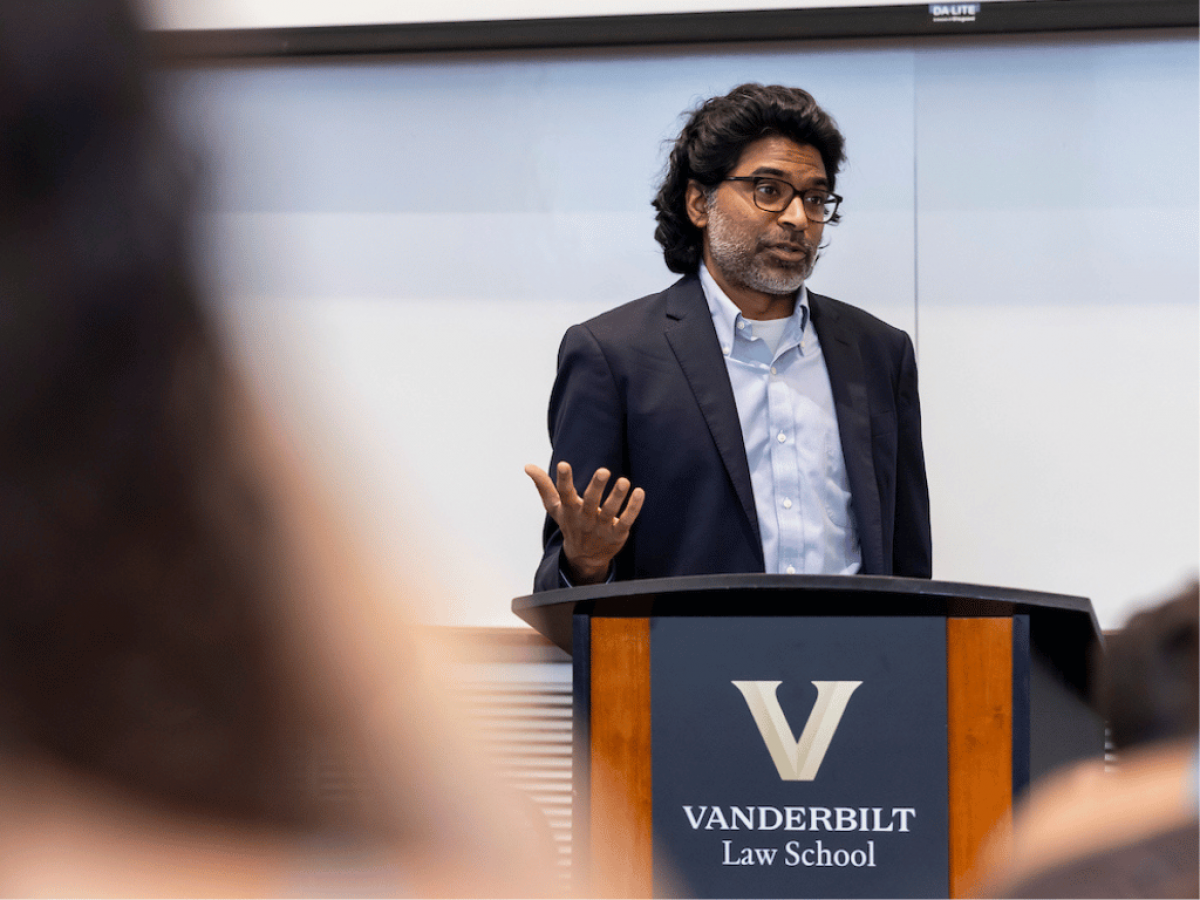Required First-Year Courses
In the 1L year, a deep dive into the study of law and reasoning provides the framework for continued development of high-level skills in analysis, problem-solving, advocacy, speaking, and writing, and also helps students identify areas of law that interest and inspire them.
Legal Research & Writing
Each Vanderbilt Law School first-year J.D. student must complete a 2-semester Legal Research and Writing course. Each Vanderbilt Law School L.L.M. student must complete a one-semester Legal Research and Writing course.
The J.D. course is taught in small sections of about 25 students each. The L.L.M. course is taught in one section. Under the leadership of the Director of Legal Research and Writing, a writing instructor and reference librarian teach each section.
Academic Programs
Branstetter Litigation and Dispute Resolution Program
Criminal Justice Program
Energy, Environment, and Land Use Program
George Barrett Social Justice Program
Intellectual Property Program
International Legal Studies Program
Law & Business Certificate Program
Program in Law & Government
Program on Law & Innovation
Weaver Program in Law, Brain Sciences, and Behavior
*Academic programs do not require applications or declarations.
Elective Courses
Upper-level offerings are almost entirely elective, allowing students to choose from a broad curriculum, combining courses, clinics, externships, independent work, and courses outside the law school to accomplish career goals. Second- and third-year students also have the option of pursuing specific areas of interest through the law school's special academic programs.
* Please note: The list below is not exhaustive, and not all classes are offered every year.
Litigation & Dispute Resolution Electives
| Criminal Procedure: Investigation | Corporate Litigation | Commercial Litigation Finance |
| Evidence | Negotiation |
Criminal Law Electives
| Actual Innocence | Appellate Practice and Procedure | Comparative Perspectives on Counterterrorism |
| Health Care Fraud and Abuse | International Criminal Law | Juvenile Justice |
| Mental Health Law: Deprivations of Life and Liberty | Policing in the 21st Century Short Course | White Collar Crime Seminar |
Environmental Law Electives
| Energy Law | Environmental Law I: Public Environmental Governance | Environmental Law II: Private Environmental Governance |
| Land Use Planning | Energy & Environmental Federalism | Sustainable Cities |
| Water Law | Local Government Law | Climate Law & Policy Lab |
| Climate Change Governance Seminar | Clean Energy Transition Seminar |
Intellectual Property Law Electives
| Antitrust Law | Copyright Law | Entertainment Industry Transactions: Negotiation and Drafting |
| First Amendment Constitutional Law | Intellectual Property and the Arts Clinic | Intellectual Property Licensing |
| International Intellectual Property | Patent Law | Trade Secrets |
| Trademarks Short Course |
International Legal Studies Electives
| Comparative Perspectives on Counterterrorism | Human Trafficking: Law, Policy, and Litigation | Immigration Law and Policy |
| International Arbitration | International Economic Law | International Labor Migration: Lawyering for Social Justice in Comparative Contexts |
| International Law Practice Lab | International Mergers and Acquisitions | International Protection of Human Rights |
| International Renewable Energy Development and Finance | International Sanctions Law and Policy | Islamic Law: from Mecca to Modernity |
| Public International Law | Transnational Litigation | United Nations Law and Practice |
Law & Business Electives
| Advanced Securities Regulation | Alternative Business Entities Short Course | Bankruptcy |
| Business and Securities Research | Contracts | Corporations and Business Entities |
| Disruptive Technologies and the Evolution of Corporate Law Short Course | Economic Regulation of Finance Seminar | Entertainment Industry Transactions: Negotiation and Drafting |
| Federal Tax Law | Government Contract Law | Healthcare Mergers & Acquisitions |
| Hedge Fund Regulation and Compliance Short Course | Introduction to Accounting | Introduction to Corporate Finance for Lawyers |
| Mergers and Acquisitions | Private Mergers and Acquisitions - Drafting and Negotiation | Real Estate Transactions |
| Role of In-House Counsel | Securities Regulation | Venture Capital Seminar |
Law & Government Electives
| American Legal History | Appellate Practice and Procedure | Constitutional Law I - Structural Questions, Federalism, and Separation of Powers |
| Constitutional Law II - Individual Rights | Family Law | Federal Courts and the Federal System |
| Federal Indian Law | Federalism Seminar | First Amendment Constitutional Law |
| Gender and the Law | Government Contract Law | International Protection of Human Rights |
| Marijuana Law and Policy | Policing in the 21st Century Short Course | Reproductive Rights and Justice |
| Stanton Foundation First Amendment Clinic | Textualism and Originalism Seminar |
Law & Innovation Electives
| Design Your Life in the Law | Law as a Business | Law Practice 2050 |
| Legal Problem Solving | Legal Project Management | Design Your Life in the Law |
| Leading in the Law |
Social Justice Electives
| Actual Innocence | Advanced Evidence & Trial Advocacy: Civil | Education Law |
| Employment Law | Employment Discrimination Law | Family Law |
| Immigration Law and Policy | Juvenile Justice | Mental Health Law: Deprivations of Life and Liberty |
| Poverty Law | Trial Advocacy |
Non-Law Elective Courses
Each semester, a limited number of non-law courses at other schools within Vanderbilt University are approved as electives eligible for credit toward the J.D. degree.
Students not participating in an approved dual degree program may receive credit for up to six credit hours of graduate-level study in non-law courses taken from other schools within Vanderbilt University.
Students participating in a dual-degree program are eligible for permitted non-law elective credits determined by the program.
Clinics and Experiential Learning
Vanderbilt's nine legal clinics allow students to learn both the theory and practice of law in context. Clinic students gain real-world legal experience by assuming the role of the lawyer under the expert guidance of members of the law faculty, working with actual clients and on real cases. The Externship Program allows students to choose and design placements tailored to their individual goals and interests.
